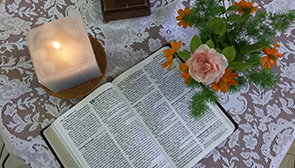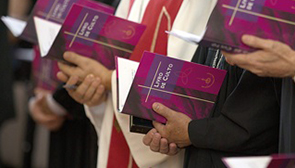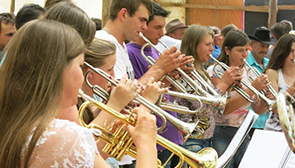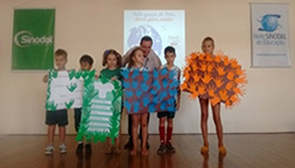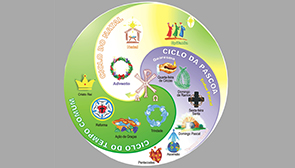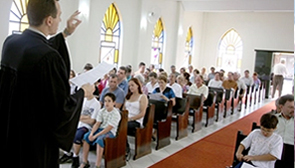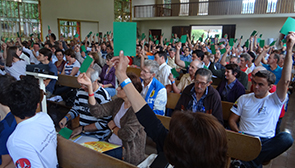Based on John 14,23-27 in connection to Acts 2,1-18 and Numbers 11,25
There was a Brazilian poet called Tristão de Athayde who wrote about the coming of the Holy Spirit or Pentecost saying:
“if Easter is the passage of time towards eternity, Pentecost is the descent of eternity into time. It is like a new Christmas. The Christmas of the Holy Spirit”. And the Church has been celebrating the feast of Pentecost throughout the centuries with this perspective: It is the day when the Spirit descended upon the world, upon humanity. It might give the impression that the Spirit had been out of God’s creation; some place “out there”, “somewhere”. But the Spirit was never “out there”, “somewhere”. The Spirit has always been “in”, “within”. The metaphoric language of “descending upon” is to communicate the movement of the Spirit “in” and “within” us; “in” and “within” God’s entire creation – like a breath that fills our lungs and only leaves our body in order to come in again. The Spirit is the primordial breath that makes everything to be what it is. She is the cosmic breath from where everything is born and to where everything belongs. Before the world started being created, the Spirit of God swept over the chaos. Before saying the first word, that principle initiating all of life, God had to breathe. That primordial breath is the Spirit herself. She is the vital strength of life. She is the capacity which enables us to relate to each other, to communicate to one another, to create community and to speak the language of love.
In the text of Numbers, Moses was exhausted because caring for people became such a burden and he was no longer able to hold on to the task God had given him to perform. Moses preferred dying than to continue as a sole leader. Therefore, God asked Moses to choose seventy elders to share the task with him. Once they were gathered they were given part of the spirit that inhabited Moses. When descending upon the elders, the Spirit capacitated them for the task to lead and to care for the people while enabling them to share responsibilities they had not shared before.
In the text of Acts, all spoke a different language, and the Spirit was the way through which the differences got united in a common understanding. Act’s experience is about communicating in deep and meaningful ways; it is about crossing barriers to encounter the other where the other is; it is about learning to appreciate the differences that characterizes all of humanity. The Spirit of God in Acts didn’t transform the different languages into one, because God loves multiplicity; God appreciates our diversity and wants us to find ways to communicate to each other. Communication doesn’t have to do with speaking the same language or living in similar ways, it has to do with what brings us together. It is beyond the tongues. It is behind the words. It speaks about what we share and what draw us close to one another.
In the Gospel reading for today, Jesus speaks to his disciples about how to be a community after his death. He teaches them two lessons: he is going to go away, yet he will not leave them orphaned. The Spirit will remain as their companion enabling them to live together around the Word that is to be lived out as love.
In John 14,23-27 Jesus answers to a question Judas asks. Jesus had said, “In a while the world will no longer see me; because I live you will also live”. Judas presses Jesus for further information by asking: “How is it that you will reveal yourself to us and not to the world?” (John 14,22).
From this question it seems Judas was expecting a revealing answer not yet given about hidden secrets not yet exposed regarding Jesus himself. However Jesus´ answer points to two directions besides himself: 1. The Word and 2. The Paraclete.
Jesus' answer says: “If anyone is loving me, that one will keep my word (logos). This conditional construction in classical Greek denotes something that is more likely to take place.
To keep (tereo) Jesus words implies in keeping his commandments (John 14,15 and 21). The basic meanings of tereo are: keep watch over, guard; keep, hold, reserve, preserve someone or something; not lose, protect, fulfill, observe, pay attention; I would say: to embrace.
To embrace the word of Jesus is more than to obey it, it is to consider it important, to take it as a reference, to value it as much as giving space to it in our daily lives, it is to hold it close to our hearts, to allow it to guide and shape us.
Keeping the word of Jesus is about loving him. Jesus answer to Judas' question establishes love as a pre-condition for keeping his word. And how do we love Jesus? Through loving others. Love for Jesus implies in love for our neighbors. It implies in washing one another´s feet (John 13,24). Therefore, to keep Jesus word is to love him and to love him is to love the neighbors with all the differences that neighbors certainly have. The exercise of loving those who are different from us is neither obvious nor automatic. It is not a decision we take and implement without consequences. It takes time, involvement, commitment; it requires learning to value the differences. We might get tired in this process, even exhausted, like Moses. We might prefer to forget all. We then need a helper.
The Gospel reading says: “The Holy Spirit will teach you everything and remind you of all that I have said to you” (John 14,25). When Jesus disciples forget the way to embrace the word Jesus taught, the Paraclete is there to remind us how to do it.
The noun Paraclete is related to the verb parakaleo which means to call to one's side -- usually asking the other for help. The noun, though, took on a legal meaning as helper in court allowing for different translations like counselor, advocate, or one who speaks for another or the more general translation of helper.
This word occurs five times in the NT. It is used in 1John 2,1 to refer to Jesus; and four times in John's Farewell Discourse (14,16 and 26; 15,26; 16,7).
The Paraclete or Holy Spirit is our helper, our reminder on how to live out Jesus word when we become oblivious to it. It speaks for us when we know no words. It inspires us to new ideas when we exhaust them all. It convinces us of peace. It teaches us everything and reminds us of all.
Remembrance is not a process that happens in isolation. The Spirit reminds us. I am not saying we don’t have to do our own individual processes of thinking, analyzing, reconstructing and confronting what we learn and how we live as individuals, but the collective process of remembering is what makes it possible to embrace the word of Jesus. To remember is to rebuild in the present what we suppose the past might have been; it is to reinterpret to this very moment the meaning of the stories and of the words; it is to re-invent through concrete gestures the contents of love. In order to live out this process of remembrance we need the other. The other is the face we had forgotten. The other is the place of our love. The other can be a person, a community, a people. The other is what is outside ourselves and still, carries the capacity to push us, challenge us, change us, hate us, love us. The other is the one who compels us to leave isolation and to become community.
Pentecost is the experience of becoming community with those who do not look like us, who do not speak the same language, who do not share cultural references and perhaps even who have a different faith system. Pentecost is the opportunity to communicate in ways we had not tried before.
In Brazil, the Evangelical Church of Lutheran Confession (IECLB) celebrates Pentecost Sunday at parishes throughout the country, mostly on Sunday mornings with liturgies specially written for that occasion. Dressing in red, altars and pulpits witness the feast that speaks of diversity and life renewed by the energy of the Holy Spirit. Schools, boarding schools, elderly people’s homes and other institutions related to the church also celebrate with creativity and joy. IECLB takes the opportunity of the Day of Pentecost to annually launch its “Vai e Vem” campaign that aims to raise funds for Mission and foment IECLB’s self-sustainability. The theme for this year’s campaign is “We are called to communicate”.
In Rio de Janeiro as well as in other regions of the country, besides celebrating at local parishes, Lutherans join Catholics, Orthodox, Reformed, Presbyterians, Baptists, Anglicans and a few other churches throughout the Week of Prayer, which is the week before the Vigil of Pentecost. Each evening there is a celebration in one of the parishes or seminaries in town which is attended by the Ecumenical crew. Traditionally in Rio the Vigil of Pentecost is celebrated at the Catholic Church in Copacabana and it is hosted by the Archdioceses of Rio de Janeiro. Catholics are majority in Brazil, therefore Lutherans give an important gender related witness when their women ordained pastors are the ones representing IECLB in those celebrations.
In Rio this year, besides celebrating together as Christians, we will call church members to engage in a campaign of solidarity with Afro-Brazilian religions that are being victims of violence by neo-Pentecostal extremist groups. Religious intolerance is growing rapidly in Brazil. Several candomblé places of worship have been destroyed in Rio. Rio de Janeiro Council of Churches is calling upon Christians to support the reconstruction of some of those places. If Christians who are intolerant are burning and pushing down the places of worship of other religions, Christians who are not intolerant will rebuild those places. We need an affirmative action to oppose this violence done in the name of Christ.
To keep the word of Jesus is to learn to love besides Christian family; it is love for the whole of humanity. This kind of love pushes us to engage in actions capable of transforming individuals and communities. It moves us from our narcissistic concerns towards somebody else’s sufferings.
There is a story written by Rubem Alves, a Brazilian theologian and philosopher of Education who passed away in July 2014. It is the story of the enchanted colorful bird that the girl who owed him, locked him in a cage so he would never fly away again, and she would never suffer with his absence. But locked, he became sad, withered, and lost his colors. She finally decided to let him go.
Many years passed and the bird returned. He was very sad!
-“What happened?” The girl asked.
- “I’m old!”
- “Who told you this?”
- “The mirror.”
And the bird took a mirror out of his feathers.
- “I don’t remember this mirror,” she said.
- “It was a gift somebody left at my door”
“How different he is”, the girl thought. “I have never seen him looking at a mirror! His eyes were always filled with worlds, mountains, snowed fields, white sand beaches, oceans, forests… Now he only sees himself… He has been bewitched! That is what happened! I have to help him!”
But the girl knew nothing about witchcraft. She then sought the advice of an old witch who told her: “a person becomes bewitched, when she becomes incapable of love. Against the spell of the mirror there is only one remedy: to rediscover love. Only love can pull people out of the trap of the mirror. Only someone who loves the bewitched person can save her.”
- “And how can I do this?” she asked.
- “There are no recipes...”
The girl started thinking in ways to make her bird happy again. She remembered he loved fruits: persimmons, cherries, mangoes, pomegranates, tangerines ... But the bird refused to eat.
He loved perfumes… She went to the garden and picked flowers and leaves: jasmine, magnolia, honeysuckle, mint, basil, rosemary… But the bird explained to her that his sadness was deeper then that. “I miss myself, I miss what I was. I search for a face that doesn’t exist anymore, a time that is passed.”
- “No, I am not giving up”, she said.
She went to the doctor and brought pills filled with joy. They were good for a while, but their effect was over soon.
Then the bird explained to her, “it is not my body that is sick; it is my soul. I don’t fly not because my wings are weak; my wings are weak because I don’t fly. I have no desire to fly, and when the desire goes away, so does the joy, and the body gets old”
The girl started crying and asked: “does it mean that there is no remedy for sadness?”
- “I know there is a place… but I don’t know how to get there… what I know is that in order to get there, one has to learn how to fly. Do you know how to fly?”
- “Of course not! I am a girl!”
- “But you have wings… you are just not aware of them…wings in girls are different… they can only be seen with the eyes of imagination!”
And she started imagining and she flew away searching for the remedy that brings joy back to the soul and heals the body. She flew to many different places, spoke with poets, monks, pastors, psychologists, psychiatrists, physicists, musicians, revolutionaries, politicians, dream interpreters… It was fascinating! But none of them had a formula, a recipe, a complete answer.
Long time passed by… at the other side of the planet her bird was still sad, still looking at his mirror. But suddenly something happened deep inside his soul. He remembered the girl. “Where was she?” He left the mirror on the table and started searching for the marks of her absence: the fruits she used to collect to make him eat, the flowers she brought as perfume, the empty room... And his heart started wishing so deeply for her return. A big smile shaped his lips when remembering what she did in order to help him to find joy again; even a laugh was heard when he remembered the pills. He missed her so much! Where was she? He desired so much to see her! He desired so much, so much, so much that suddenly his wings opened and he flew away… with the energy of somebody who just found love again.
Rubem Alves story speaks of commitment, of solidarity, of crossing borders in order to find ways to help others, to create alternatives, to transform other people’s reality. It speaks of the courage to leave behind self-centered concerns and to move towards the other as part of a decision-making process to overcome isolation and to build community.
At this Pentecost Sunday we pray the Spirit who lives “in” and “within” God’s creation, to capacitate us for the task to lead and to care while enabling us to share responsibilities we have not shared before. We pray the Spirit to assist us to identify what draw us close to one another and to remain as our companion as we live together around Jesus Word. And when our eyes are filled with ourselves instead of being filled with other people’s worlds we ask the cosmic breath to move us to new visions, to news ways of communicating, to new memories, commonly constructed in our search to love and care.
Sermon written by Rev. Lusmarina Campos Garcia


